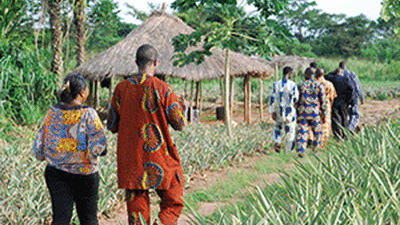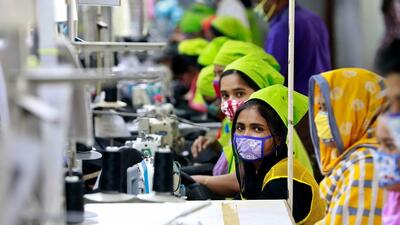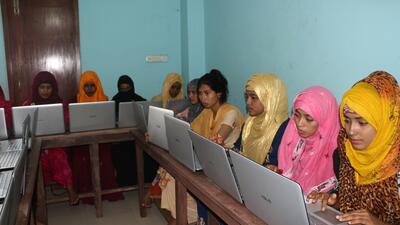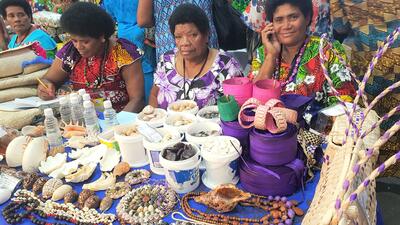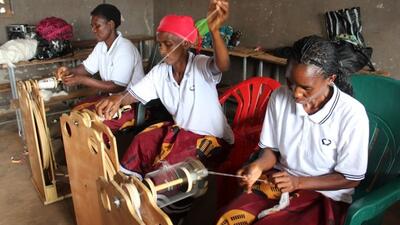Developing Countries Urged to Focus on the Value of Exports Rather Than Volume
ITC Executive Director opens annual advisory group meeting
Focusing on the value of exports rather than simply their volume is a key means for developing countries to survive and prosper in times of economic crisis, said Patricia R. Francis, Executive Director of the International Trade Centre (ITC).
A focus on value required long-term thinking, ensuring equity and inclusiveness, and being innovative in seeking new opportunities through diversification, Ms. Francis said. ‘In a time of limited resources - financial, food and natural - it is essential to think “value” if we are to overcome the challenge of access to these scarce resources, and ultimately to address poverty’.
She was addressing the opening session of the 44th annual meeting of ITC’s Joint Advisory Group (JAG), which brings representatives of its 192 member countries together to review the activities of the organization and to consider its future plans. ITC is a joint agency of the United Nations Conference on Trade and Development (UNCTAD) and the World Trade Organization (WTO). Today’s session was attended and addressed by UNCTAD Secretary-General Supachai Panitchpakdi and WTO Director-General Pascal Lamy.
Dr. Supachai expressed his satisfaction that UNCTAD and ITC, as members of the United Nations Chief Executives Board Inter-Agency Cluster on Trade and Productive Capacity, had worked together in all of the One UN pilot countries.
He suggested that in the year ahead collaboration should focus on improving trade facilitation to enhance trade competitiveness; improving trade support institutions and the business environment; trade intelligence; the interface between environmental issues and trade policy, with a particular focus on the natural resource-based sectors, including organic food; improvement of supply chains; and the integration of regional and global value chains.
There was also a need to concentrate on obstacles facing African small and medium-sized enterprises in entering global value chains and on support to public–private dialogue on the implications of European partnership agreements, especially those concerning trade in services, competition policy and trade and investment.
Turning to Aid for Trade, Dr. Supachai said the initiative was critical for developing countries, and particularly least developed countries (LDCs), for the proper functioning of their productive and export capacities and long-term competitiveness. He welcomed ITC’s moves to filter all projects and programmes through the Aid for Trade perspective and its concentration on the private sector.
The UNCTAD chief declared: ‘I am confident that donors will continue to support ITC’s important contribution to the private sector and export competitiveness in developing countries.’
Mr. Lamy said that reports WTO was receiving indicated that while trade finance market conditions in most regions of the world had improved, ‘in Africa the situation is still dire and more support is needed. ITC’s support in this regard will be highly appreciated.’
Mr. Lamy said ITC had been able to deliver and meet its clients’ expectations despite the challenges of implementing a change management programme. He added: ‘We are encouraged by the fact that ITC’s investment of extra budgetary resources in Africa has exceeded expectations. We note that around 60% of programme resources were spent in sub-Saharan Africa.’
He said WTO looked forward to continuing to work with ITC on supporting accession of LDC’s to the organization and on Aid for Trade, for which WTO considered ITC a key partner.
Ms. Francis said the agency’s strategic priorities for the coming year were to escalate the pace and improve the quality of the delivery of ITC programmes, emphasizing the in-country ownership of these projects, to continue to build a robust results-based management structure and to continue to collaborate with UNCTAD, WTO and other United Nations agencies on the Aid for Trade initiative to work towards achievement of the Millennium Development Goals.
At the operational level, Ms. Francis said ITC would seek to expand access for beneficiary countries to global supply chains by engaging further at market-destination level, especially with multinational corporations; enhance the cross-cutting areas of gender, environment, sustainability and global partnerships; roll out a new ITC Benchmarking Programme; enhance the reach and impact of publications and global public goods; and launch a new website and client relationship management system to better communicate with beneficiaries.
Ms. Francis concluded by returning to the theme of value, ‘not in what we say, but what we do.’ In the long term, it was the sustainable impact that ITC’s work had on the people it served that mattered she said.
As well as reviewing ITC’s programmes and priorities, the two-day JAG meeting will hear updates on the outcomes for ITC of the World Export Development Forum and the World Trade Promotion Organizations Conference and Awards. There will also be discussion of how the new trade environment emerging from the global economic crisis will affect LDCs, with a contribution from the Chair of the 44th Session, Ambassador Darlington Mwape. Two panel discussions will also be held on the themes of supporting country ownership through results-based management and business perspectives on overcoming obstacles to trade.
The JAG meeting will be attended on Friday by Sindiso Ndema Ngwenya, Secretary-General of the Common Market for Eastern and Southern Africa (COMESA). Working with regional economic communities such as COMESA is a high priority for ITC in its efforts to build capacities for exporting by developing countries at the regional level.






